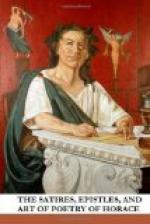I chafe to hear a poem called third-rate
Not as ill written, but as written late;
To hear your critics for their ancients claim
Not charity, but honour and high fame.
Suppose I doubt if Atta’s humorous show
Moves o’er the boards with best leg first or
no,
The fathers of the city all declare
That shame has fled from Rome, and gone elsewhere;
“What! show no reverence to his sacred shade
Whose scenes great Roscius and Aesopus played?”
Perhaps with selfish prejudice they deem
That nought but what they like deserves esteem,
Or, jealous of their juniors, won’t allow
That what they learnt in youth is rubbish now.
As for the pedant whose preposterous whim
Finds poetry in Numa’s Salian hymn,
Who would be thought to have explored alone
A land to him and me alike unknown,
’Tis not that buried genius he regards:
No; ’tis mere spleen and spite to living bards.
Had Greece but been as carping and as cold
To new productions, what would now be old?
What standard works would there have been, to come
Beneath the public eye, the public thumb?
When, having done with fighting, Greece began
To care for trifles that refine the man,
And, borne aloft on Fortune’s full flood-tide,
Went drifting on to luxury and pride,
Of athletes and of steeds by turns she raved,
Loved ivory, bronze, and marble deftly graved,
Hung raptured on a painting, mind and eye,
Now leant to music, now to tragedy,
Like a young child that hankers for a toy,
Then throws it down when it begins to cloy.
With change of fortune nations change their minds:
So much for happy peace and prosperous winds.
At Rome erewhile men rose by day-break, saw
Their clients at their homes, laid down the law,
Put money at good interest out to loan
Secured by names responsible and known,
Explained to younger folk, or learned from old,
How wealth might be increased, expense controlled.
Now our good town has taken a new fit:
Each man you meet by poetry is bit;
Pert boys, prim fathers dine in, wreaths of bay,
And ’twixt the courses warble out their lay.
E’en I, who vow I never write a verse,
Am found as false as Parthia, maybe worse;
Before the dawn I rouse myself, and call
For pens and parchment, writing-desk and all.
None dares be pilot who ne’er steered a craft;
No untrained nurse administers a draught;
None but skilled workmen handle workmen’s tools:
But verses all men scribble, wise or fools.
And yet this scribbling is a harmless craze,
And boasts in fact some few redeeming traits.
Avarice will scarce find lodging in a heart
Whose every thought is centred on its art;
He lays no subtle schemes, your dreamy bard,
To circumvent his partner or his ward;
Content with pulse and bread of ration corn,
Mres, losses, runaways he laughs to scorn;
Useless in camp, at home he serves the state,




